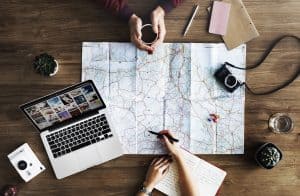Planning a vacation or extended trip is exciting. It’s easy to get caught up in the fun of dreaming about where you’re going and what you’ll do when you get there. But it’s important to include plans for travel security both before and during your holiday.
Just like creating a packing list and agenda of things you want to see you should also create a trip planning checklist for equally important, if less exciting, safety considerations. Things like travel insurance, required documents, medications, and home security while you’re away.
Granted these sensible concerns aren’t as fun as researching what hotel to stay in, which restaurants to eat at and what sights to see. But, if you plan for your safety and security while traveling you’ll be able to relax and enjoy your vacation that much more.
Travel preparation checklist
There are almost as many safety concerns to consider before you start your vacation as there are during. The following pre-travel safety tips are based on our own years of travel as well as suggestions from safety and security professionals.
1. Home security
 Nobody wants to come back from vacation to find their house has been burgled but leaving your home empty for a period of time does increase the risk. The good news is there are many ways to help prevent this devastating scenario.
Nobody wants to come back from vacation to find their house has been burgled but leaving your home empty for a period of time does increase the risk. The good news is there are many ways to help prevent this devastating scenario.
One of the best ways to secure your home is with a good alarm system. These days there are many different features available with home security and a good company will be able to advise the best product for you. Of course, an alarm system only works if you use it so make sure it’s all set up and working before you go away.
It’s also important to make your house look lived in while you’re gone. Ask a friend or neighbor to collect your mail and mow the lawn if you’ll be away for more than a few days. Also, set up timers on your lights so it looks like someone is home in the evening. If you take your car with you and it’s usually parked in the driveway see if a neighbor will park one of their cars there.
Another alternative is to get a house sitter to stay in your home while you’re away. Even if you do have an alarm system the extra security of not leaving your home empty is great for peace of mind. Plus if you have pets it saves from having to board them.
2. Travel and medical insurance
Insurance is one of those things we all hate to spend money on but without it, you’re opening yourself up to a big financial risk. Before buying a policy do your research on the many different insurance plans out there and ask friends and family for ones they’ve used and like.
You’ll want to be covered for both medical and trip insurance and sometimes they’re sold separately so be sure you know exactly what’s covered. Take the time to read all the conditions and ask plenty of questions from the insurance provider.
3. Health
 If you take medications on a regular, or even an occasional basis, make sure you have more than enough to carry you through your vacation. Even if they’re over the counter drugs it’s best to take a supply if you’re traveling to a different country in case they don’t have the same thing or require a prescription.
If you take medications on a regular, or even an occasional basis, make sure you have more than enough to carry you through your vacation. Even if they’re over the counter drugs it’s best to take a supply if you’re traveling to a different country in case they don’t have the same thing or require a prescription.
Check with the CDC (Center for Disease Control) and WHO (World Health Organization) for health notices in the areas you’ll be traveling as well as a list of vaccines that may be required or recommended. Prevention is the best medicine as the saying goes.
4. Documents
Be sure you know what documents you’re required to have for travel and have them all in order at least a month before you depart. If you’re leaving the country you’ll almost definitely need a passport but you may also need a visa or other special documents. Some of these items may take a while to obtain so don’t leave it to the last minute.
It’s also a good idea to get copies of all of your documents and carry them separately from the originals. You may even want to leave copies with a friend or family member so they can email them to you if needed.
5. Research
 Of course, you’ll be researching your destination for accommodations and things to see and do but it shouldn’t end there. You should also research things like local laws and customs, currency, travel advisories, local popular scams, safety concerns, weather, crime potential, standard opening hours, and appropriate dress.
Of course, you’ll be researching your destination for accommodations and things to see and do but it shouldn’t end there. You should also research things like local laws and customs, currency, travel advisories, local popular scams, safety concerns, weather, crime potential, standard opening hours, and appropriate dress.
Tip: Wikipedia has a page that shows clothing laws by country
Tourism boards and travel blogs are good places to find out about everyday things like local customs and weather. For travel advisories and safety concerns check with sites like the US State Department or Foreign Affairs and International Trade Canada. Here, they list every country and any possible concerns with safety and political unrest, etc. Just keep in mind that these sites tend to err on the side of caution and can be very country general. Use the information to be informed but don’t necessarily let it stop you from visiting.
Safety while traveling
Naturally, your main focus while traveling will be having fun, relaxing, meeting new people and seeing new and exciting things. However, forgetting about safety can ruin all of this. By informing yourself of a few simple things you can very likely avoid a bad situation or at least be prepared to deal with it.
1. Transportation
 If you’re flying to your destination make sure to check what you’re allowed to bring on the plane. There are lots of restrictions to consider around carrying liquids, powders, food items, flammable objects and even some types of batteries.
If you’re flying to your destination make sure to check what you’re allowed to bring on the plane. There are lots of restrictions to consider around carrying liquids, powders, food items, flammable objects and even some types of batteries.
The USA lists all restricted items on the TSA (Transportation Security Administration) site and Europe lists on EASA (European Union Aviation Safety Agency).
When traveling on any transportation always keep your valuables close and preferably tethered in some way. Based on our own personal experiences we highly advise you not to place valuables under your seat or in an overhead bin especially if you plan to sleep or be absorbed in a task like reading. We know of people who have had their wallets stolen right out of their purse even though it’s placed directly below or above their seat.
2. Secure valuables
Aside from the tips above on transportation, it’s important to secure your valuables wherever you are. If you have a safe at your hotel use it to store passports, cash, credit cards, jewelry, etc. If there’s no safe available find another way to lock up items. Sometimes there are locking closets or drawers in the room that will deter thieves looking for a quick grab.
We always travel with a Pacsafe anti-theft cage which can be used to secure valuables in your hotel room, on a bus or even at the pool.
When you’re out and about refrain from wearing expensive jewelry or walking with your phone in your hand and carry your purse or backpack in a way that it can’t be easily snatched from you.
3. Health
You may be the picture of health at home but traveling can mess with your body as it adjusts to new food, water, bacteria, and climate. Many people also tend to throw their healthy habits out the window on vacation by eating poorly, drinking too much alcohol and not exercising.
While it’s great to take a break from the norm and enjoy a bit of self-indulgence keep in mind that one day or night of fun can ruin a whole week of your vacation. Balance your drinking and rich eating with healthy meals and lots of water, keep taking your regular medications and maybe even up your vitamins, wear sunscreen and a hat in hot weather and try to throw in a bit of exercise and rest.
**Here are some tips on how to stay healthy while traveling
4. Money
 Most of the world has easy access to ATMs so it’s really not necessary, or advisable, to carry a lot of cash with you. We travel with a small amount of the local currency, usually just enough to get us to our destination. We then withdraw cash or use credit cards. Of course, there are some remote places or small towns where you will need cash so make sure to add that question to your research project. If you need to carry cash consider using a hidden money belt and definitely don’t carry cash in your back pocket or the front compartment of your backpack.
Most of the world has easy access to ATMs so it’s really not necessary, or advisable, to carry a lot of cash with you. We travel with a small amount of the local currency, usually just enough to get us to our destination. We then withdraw cash or use credit cards. Of course, there are some remote places or small towns where you will need cash so make sure to add that question to your research project. If you need to carry cash consider using a hidden money belt and definitely don’t carry cash in your back pocket or the front compartment of your backpack.
It’s a good idea to travel with at least two different credit cards and two different debit cards and to keep them in separate places. It’s best to separate your cash as well so if you lose your wallet or purse you have backup cash and cards.
Keep copies of all your cards as well as bank contact information so you have the numbers you need even if you lose the actual card.
5. Digital security
This one may sound strange coming from travel bloggers but limiting what you post on social media is a big safety tip when you’re away from home. Posting where you are, what you’re doing, and at what time may tell the world too much for your own good.
Also, protect yourself from identity theft by being careful when using free WiFi zones, making sure your smartphone or tablet are locked and encrypted, using complex passwords on all accounts and consider using two-step verification on the most important ones.
6. Use common sense
 A little common sense goes a long way when it comes to staying safe both at home and abroad. Avoid walking alone at night and even during the day in isolated, unfamiliar areas. Stay alert and walk with confidence as criminals tend to look for targets who aren’t paying attention to their surroundings or who look easy to intimidate.
A little common sense goes a long way when it comes to staying safe both at home and abroad. Avoid walking alone at night and even during the day in isolated, unfamiliar areas. Stay alert and walk with confidence as criminals tend to look for targets who aren’t paying attention to their surroundings or who look easy to intimidate.
Trust your gut! Our animal instincts may not be as strong as they were thousands of years ago but we still have them and they’re worth listening to. If you feel uneasy with a place or situation remove yourself from it even if you feel silly for doing so.
7. Keep a low profile
Try to dress like the locals and look like you know where you’re going. Of course, locals are the target of crime as well and it’s not always easy to blend in but being an obvious tourist can often make you a target.
Also, avoid flashing lots of money and wearing expensive jewelry especially in poorer countries where your gold watch could feed a family for a month. If you do need to carry a larger amount of cash keep it in separate places on your body so that you don’t have to pull it all out to pay for a small item.
8. Ask a local
 Whenever we arrive in a new destination we always ask locals for advice on where to go and where not to go. Not only will you discover some great local restaurants and off the beaten path sights but you’ll be better informed on areas and places to avoid.
Whenever we arrive in a new destination we always ask locals for advice on where to go and where not to go. Not only will you discover some great local restaurants and off the beaten path sights but you’ll be better informed on areas and places to avoid.
Locals will be able to tell you what neighborhoods are unsafe at night, what bars tend to attract a sketchy crowd and even what touristic sites have a high rate of pickpockets or scam artists. Plus, there’s the added bonus of making new friends who may even offer to take you to their favorite eatery.
9. Carry your emergency contacts
Carry all of the emergency contacts you may need such as numbers for your local embassy, local emergency (not everywhere is 911), travel insurance provider, personal emergency contact, bank and credit cards.
It’s best to carry the most important ones on your person at all times. We have them on our phones and also printed on a small card we keep in our wallet or pocket.
10. Communication
 If a different language than your own is spoken at your destination we highly recommend learning and using some basic words and phrases. Not only does this help you with day to day things like meeting people and ordering a meal or bus ticket it’s also a good safety tip.
If a different language than your own is spoken at your destination we highly recommend learning and using some basic words and phrases. Not only does this help you with day to day things like meeting people and ordering a meal or bus ticket it’s also a good safety tip.
By knowing how to say simple things like please, thank you, excuse me, help or hospital you will be able to better communicate when you need assistance. If you’re not good at remembering a foreign language make sure to carry a language phrasebook or download a translator.
Final thoughts on travel safety
This list may seem daunting and even a little scary if you’re new to traveling but obviously, that’s not our intent. We just believe in being prepared and educated and we know these tips will help with exactly that.
After seven years of traveling full-time all over the world, we can honestly say that we’ve had only a few minor negative situations and zero major ones. Part of that is luck, of course, but we believe that it’s mostly due to the fact that we follow all the above steps and tips everywhere we go. Making travel security and safety a priority is more than worth the effort it takes.
Here are some of our personal favorite travel security items:
If there was one brand that we wouldn’t travel without it’s Pacsafe. We were lucky that a family member worked for Pacsafe when we first started traveling and gave us each a bag and wallet to try. Since then we’ve purchased several more items and have traveled with them constantly for six years.
They may not be the least expensive brand on the market but we can tell you from personal experience their products last forever and give you invaluable peace of mind.
A door and window alarm is a must for peace of mind, especially if you’re a female solo traveler or if you tend to stay in more budget accommodations. The double cable lock is great for securing your bag to a stationary object. You may think a whistle is mainly used for outdoor adventures but as a female, I appreciate knowing I can attract help anywhere.
Pin It For Later

Born in England, Sarah developed her wanderlust at a young age as she traveled around Europe with her parents. As a young adult she spent every penny she could on experiences as opposed to possessions. Eventually she found a way to earn a living doing what she loved: traveling, writing and capturing images of the wondrous world we live in. When not on the go Sarah enjoys time in her “sometimes home” of Vancouver.



